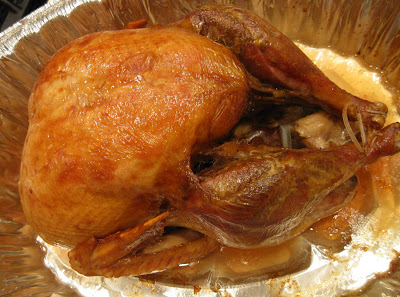
Ready for the table . . .
The bird is now bones, the cranberry has been relished, and I'm stuffed. It's the morning after Thanksgiving and I'm still digesting yesterday's bounty of turkey, trimmings and wine. Perhaps it's the inevitable crash after the carbohydrate high or maybe it's the tryptophan reacting with the ethanol but I find myself in a funky mood after I woke up thinking, "Is that it?"
For all my sunshine and smiley-face sermonizing about family traditions and joyful commensality, the foremost memory of the past day's events was my feast of over-indulgence. It didn't help that a few weeks prior, one of the readings for my Anthropology of Material Culture class (the same course that inspired my "Vampire Bats and Halloween Candy" post) focused on debunking Thanksgiving.

. . . headed for the soup pot.
The essay, "Haunted by the Pilgrims" (in The Art and Mystery of Historical Archaeology), basically argued that the genesis of the Thanksgiving holiday that we all know and love is as much myth as fact. According to author and historian James Baker, the Pilgrim Story developed from the collective history of early American colonists who ranged from English Puritans in Plymouth, MA (ostensibly the location of the first Thanksgiving) to French Huguenots in Florida. The lore as we know it today helped formulate a symbol of communal American values with which all citizens could identify and emulate. Wrote Baker:
"[It was assumed that] the Pilgrim Story, like the American way of life, contained a message relevant to the lives of people throughout the world."
As a result, Thanksgiving, and the food associated with it, played an important role in assimilating immigrant families who could affirm their new identities by participating in the most American of holidays. Noted Donna Gabaccia, in her book We Are What We Eat: Ethnic Food and the Making of America,
"No other eating event so symbolized the changing eating habits in ethnic enclaves as an immigrant family's first Thanksgiving celebration . . . [a] partial success story of culinary Americanization, since many immigrant mothers prepared the feast when children requested it after studying the Pilgrims in school."
I remember how my mother, an accomplished cook, struggled to produce a moist turkey from her oven but never quite succeeded. Still, she tried year after year, perhaps believing that without this iconic centerpiece of the holiday table, it wouldn't be a true Thanksgiving. Maybe it was the subconscious memory of her annual frustration that led me to order a pre-made turkey for my own celebration. Coupled with a bloated belly, my holiday retrospective was dim: was I simply a willing, gluttonous participant in an indoctrinal mythology of Americana?

Then, I came across a post-Thanksgiving article, "In Lean Times, Comfort in a Bountiful Meal" on the New York Times website (www.nytimes.com). In essence, it discussed how Americans, despite these difficult economic times, are determined to enjoy a plentiful and generous holiday meal as they have done in more prosperous years of the past. The article also described how people of varied ethnic backgrounds merge their adopted nation's celebration with aspects of their original cultures by adding foods of their birthplace to the traditional Thanksgiving menu. The story was a serendipitous answer to my sudden cynicism: in the current context, Thanksgiving as a national holiday comforts us with the knowledge that our families are joined by others throughout the country in times of celebration and hardship. And for immigrant families, it allows us to participate as Americans while honoring our distant yet equally important origins.
I reflected on the New York Times article and what I would write in this post throughout this day after Thanksgiving. Now, the night stars are beginning to appear and I've indulged myself again with copious leftovers. But the questions, doubts and cynicism have been allayed. Fact, myth, lore, or history - Thanksgiving is our story and we're sticking with it.








4 comments:
love this post! hope you had a fabulous thanksgiving :)
Thanks Heather! I did indeed have a fabulous Thanksgiving despite the rather glum start to this post might have suggested. 8-)
I love this, and my turkey was picked even cleaner by my hands for the leftover menu... I like the use of 'copious' in this...
Chef E - there was even less after I took the picture! We couldn't stop picking at the poor thing.
Post a Comment